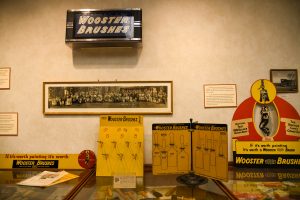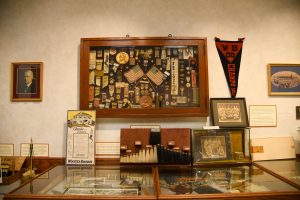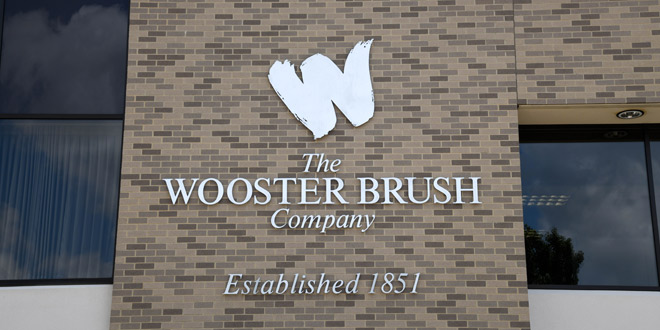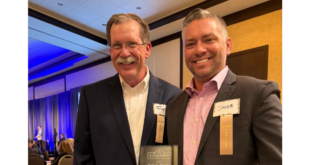Sponsored by The Wooster Brush Company
Through depressions and recessions, world wars and worldwide pandemics, the world has changed dramatically in the last two centuries. A mainstay for over 170 years, The Wooster Brush Company in Wooster, Ohio, has weathered the dynamic world and changing manufacturing landscape, updating processes and products along the way. But one thing hasn’t changed: the heart of Wooster Brush and its commitment to the customers and employees who make it successful.
 Adam Foss founded The Wooster Brush Company in 1851 at the age of 18, after he bought a crate at a public auction in Cincinnati containing Chinese bristle. With the help of his brother, he used the bristle to make and sell the first Wooster brushes door-to-door in Ohio.
Adam Foss founded The Wooster Brush Company in 1851 at the age of 18, after he bought a crate at a public auction in Cincinnati containing Chinese bristle. With the help of his brother, he used the bristle to make and sell the first Wooster brushes door-to-door in Ohio.
The Wooster Brush Company has been part of downtown Wooster since it opened, with today’s employees walking the same hardwood flooring as their counterparts from decades ago. The company has expanded throughout the years and has plans in place for an additional facility in Wooster, adding jobs and continuing to contribute to the community. It also prides itself on being vertically integrated and manufactured in the USA.

NHPA recently talked to The Wooster Brush Company president Ben Maibach, senior vice president of sales and marketing Scott Rutledge and vice president of national accounts Jeff Rowekamp to talk about the company’s commitment to quality control, the importance of company culture, how it supports the independent channel and what’s ahead.
North American Hardware and Paint Association (NHPA): Quality control is one of your company’s cornerstone values and can be seen throughout the production process and beyond. Why is quality control important to your company?

Scott Rutledge (SR): Quality control touches all areas of our business. We must be consistent with the product we produce on a day in, day out basis. If we’re not consistent with the product then we let somebody down, and they don’t have any reliability or trust in what we’re putting out. Our employees are empowered to stop production along the way if they see something that is not right—a bad handle, the wrong blend of filament or a ferrule that is not quite right.

Ben Maibach (BM): The term we use is “purposefully inefficient.” We will never sacrifice quality for efficiency. If we can’t do it more efficiently at the same or better quality, we won’t do it. We improve and adapt products over time to adjust to the industry and customer needs, but within those changes, we want each product to offer the same high-quality performance every single time.

Jeff Rowekamp (JR): We also strive for consistency. For example, a professional painter knows exactly how a Wooster brush is supposed to feel and perform. It is important that we are consistent with our quality so we meet those expectations every time.
SR: We have multiple generations of the same family working here, and that commitment to quality has been passed along from generation to generation. We stress to our employees the importance of quality control. We ask them and ourselves, “Is this a tool you would use in your house?” If it isn’t something we’d use ourselves, then it isn’t something we want to sell to customers. Historically, the only way we’ve been able to continue to garner the market share we have and maintain the loyalty of our customers is to have those inspections and maintain a high standard of quality on a day-in, day-out basis at all levels of the company.
NHPA: How has your company culture played a role in your success?
BM: Communication is extremely important to our culture; we strive to communicate with our folks as best we can. When we make major changes or big things happen, we want them to understand why. Part of the reason we’ve been around for 171 years is because we make the best long-term decisions. Sometimes that means not every choice is going to be popular in the short term, but we really try to show the why behind our decisions to get everyone on board. And we instill that type of thinking across the company, from manufacturing, engineering, production, sales and beyond.
 NHPA: What are some of the other key components of your company culture?
NHPA: What are some of the other key components of your company culture?
BM: The first one on the list is “do the right thing.” We find ourselves thinking, “If we just do the right thing, in the long term we will be benefited.” It might cost us a nickel here, or more than a nickel there. But we know that if we do the right thing over time, it will be good for our employees, it’ll be good for our customers and good for everyone who is associated with us. We also talk a lot about putting people first and how we’ve developed a family atmosphere here. Beyond just the multiple families and multiple family generations that work here, we really do try to treat each other like family. That atmosphere also helps when it comes to recruiting additional employees because our current employees happily share with friends and family how much they love working for Wooster Brush and encourage others to apply.
JR: Our employees work in a very safe environment, which is important to keep our employees safe and comfortable. They know when they come to work, they will be taken care of. We go above and beyond when it comes to health care benefits and other perks, but our employees are our family and we treat them as such. We do things a little differently than how most other companies are probably doing it today, but it’s working for us.
NHPA: What types of resources do you offer to retailers to help them sell your products?
SR: We’re very big on merchandising and have led the marketplace in that regard. It’s expensive to provide hardware, hooks, baskets, signs and all those types of materials, but it’s worth it because we want to make sure our retailers have the best display and the best presentation.
From an educational standpoint, we offer training sessions, host pro events and call on and listen to painting contractors. We want to arm retailers with the knowledge so they can guide customers to the right tool for the best outcomes.
So many consumers think “I’ve already spent $50 on a gallon of paint, let’s just go with the $2 brush.” But when the results aren’t what they expected, no one blames the applicator, they blame the paint. We want to educate and equip every painter with the right tools, including offering tools for specialty products and coatings.
Our field sales teams are key because they are the ones in the stores educating retailers. Having those teams that can go into a store and build trust, knowledge and relationships is very beneficial to the retailer. We also have a robust promotional calendar we launch each year, to assist the retailer in the sale of Wooster applicators.
NHPA: How are you utilizing technology to help retailers?
JR: One of the areas we are really starting to focus on is videos and digital content. We still have customers who like the binders of our merchandise, but we also want to reach the younger generations who want the information in the palms of their hands. We want to provide content and resources to retailers in the easiest way possible so they can then easily share the benefits and purposes of our products with their customers.
NHPA: The Wooster Brush Company recently underwent a major rebranding project. Tell us more about the rebranding and how it aligns with your company culture and future plans.
BM: The Wooster name is very strong, and it stands for quality. The rebranding was an effort to take all that goodwill that we’ve had and add the visual element of our name and red color and tie that together. We wanted to elevate our brand and build on the last 170 years.
NHPA: What does the future look like for you? Tell us about the new building project you’re taking on.
BM: Outside of the standards, such as continuing our culture and our quality, we’re really looking toward continued growth as well. We’ve embarked on a project north of the city that will set us up to grow in the short, medium and long term. We want to continue to grow, in order to be able to continue to give back to our employees. And I think that that’s really the structure of what we’re trying to do.
SR: We’ll continue to innovate because the marketplace continues to change. We never try to innovate with anything that’s gimmicky, but instead, we bring out products that have real value and merit and are beneficial. We listen to the contractors, and we’ll continue to listen to them. The expansion also gives us the opportunity to investigate other markets that continue to spring to the forefront. E-commerce is something else we are exploring to determine what our role will be in that area.
NHPA: What does your future look like in the traditional independent marketplace?
SR: The traditional marketplace is a key part of our foundation. It’s very important to us to maintain the relationships we have in the independent channel. We want to meet their expectations and help them in any way that we can. We have established ourselves as a high-end, high-quality manufacturer of goods, and we want to maintain that relationship. We don’t want the traditional marketplace to feel like they continually have to compete with the big boxes but reinforce that they have their own areas of growth opportunities. People turn to the traditional market for help, guidance and education, and that’s where their value lies. We want them to know that they have value not only to us, but they have value to their customers and the independent market.
NHPA: How did The Wooster Brush Company fare during the pandemic?
JR: We had never had a backorder before the pandemic, and we had to come up with a process when the pandemic hit. One of the things we recognized very quickly was we were way ahead of our competitors from a fill perspective and rebounded quicker. A lot of that had to do with making everything here, everything is made in the U.S.
BM: Our business grew with independents. They continue to strive through the pandemic, and we continue to invest in them. For one, we invest in inventory, so they have what they need when they need it. We also invest in our future, preparing for what independents might need in 10 years. We also invest in more traditional ways such as discounts on a new store order. Our employees worked extremely hard for two years, every single one of them. It’s critical to remember that work and sacrifice. People don’t always think of that as an investment, but our employees took the time they could have used somewhere else and invested it to help Wooster Brush and ultimately to help our independent retailers.
Learn more about NHPA’s trip to The Wooster Brush Company factory here.
 Hardware Retailing The Industry's Source for Insights and Information
Hardware Retailing The Industry's Source for Insights and Information








